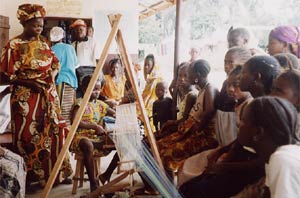
By Deborah George | |
REPORTER'S NOTEBOOK
Sierra Leone's Civil War
Following the international diamond trade brought Senior Producer Deborah George back to Sierra Leone in the summer of 2001.
I first visited Sierra Leone in 1996. Even then, it was the most dilapidated place I'd ever seen. The streets of the capital, Freetown, were deeply rutted and lined with open sewers. Narrow alleys led to warrens of unpainted wooden houses from the 1700's. Near the waterfront and the shabby colonial-era Parliament buildings was Freetown's one claim to fame — the old City Hotel where in 1941, Graham Greene lived. His acclaimed novel The Heart of the Matter was based on those experiences. When I first saw it, however, it had long ago ceased to be a hotel. The windows were empty, the veranda sagged, the floors were rotting and its dark interior was filled with hundreds of refugees.
Today, it's a burned out shell, its front facade rising up from the rubble like the Parthenon. The rest of the city isn't much better. In 1997, the rebels of the Revolutionary United Front (RUF) rampaged through the city, setting fires along the way. Plus, Freetown is bursting its seams with thousands of refugees from the countryside. The most heartbreaking sign of the war is the sight of people maneuvering through the rutted streets on crutches or in rickety wheelchairs. Their limbs were hacked off in the rebels' terror campaign.

Girls captured by the Revolutionary United Front who are now free learn weaving. The rebels captured thousands of children in raids and many of them became fighters. Photo: D. George |
How did this all come to be? Like neighboring Liberia, Sierra Leone shares some history with the U.S. It was founded in the 1700's by ex-slaves. Some were freed from slaving ships captured along the coast. Others, calling themselves the "Nova Scotians," had fought with the British (who promised them their freedom) in the Revolutionary War against the American colonists. Afterward they fled, first to Canada, and then here when British philanthropists offered them land.
In 1961 the country gained its independence from the British and began a long slow drift into poverty. Its resources, mostly diamonds and minerals, were funneled into foreign corporations and pocketed by a succession of remarkably corrupt governments whose officials tooled around in green Mercedes Benzes.
There have always been tribal tensions between Sierra Leone's dozens of ethnic groups but, for the most part, Sierra Leonans are just hard working people. Muslims, Christians, and followers of traditional beliefs have lived together in peace, often within a single family.
But in 1992, a group calling itself the Revolutionary United Front (RUF), backed by Liberian dictator Charles Taylor, began collecting disaffected young men into a fighting force. Some went willingly; others were forced. The rebels also captured thousands of children in raids and many of them became fighters too. By now, there's little pretense of political ideology in this war. Its main fuel is the millions of dollars to be made from the diamond trade.
A trip to the diamond fields in the southeastern part of the country means a drive along the infamous stretch of potholed road called Mile 91. Every few yards along the road are the rusted carcasses of burned out trucks, which look like huge prehistoric birds. In one area, I'm told, the rebels burned so many cars and trucks, that the locals jokingly call it 'Foday Sankoh's garage'.
Only a few yards from the side of the road, a woman wrapped in a torn and dirty cloth, squats and defecates. This immodesty shocks me as much as the amputated hands and feet I've seen. It's a sign of just how worn the social fabric has gotten.
Now, a peace accord has been signed. British and Nigerian peacekeeping forces are overseeing the combatants from both sides who are laying down their arms. But even if the peace process goes forward Sierra Leone faces an uncertain political future. After a decade of war, the country sometimes seems just a collection of camps run by international aid groups — camps for internally displaced people, camps for amputees, camps for children who've been released or have run away from the rebels.
The hope here is in the great number of people in Sierra Leone who are looking forward to again having a job or working a piece of land, who want justice but are also quite willing to forgive.

